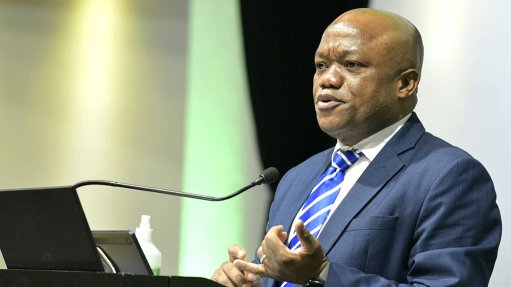
Public Works and Infrastructure Minister Sihle Zikalala
The Department of Public Works and Infrastructure (DPWI) has initiated a comprehensive standardisation programme aimed at streamlining the construction of facilities with similar purposes, such as schools and police stations. This strategic move involves designing and building these structures according to a set of standardised parameters.
Public Works and Infrastructure Minister Sihle Zikalala mentioned this in an address at a South African Council for the Project and Construction Management Professions conference, in Johannesburg, on November 14.
The primary motivation behind this initiative was to curb the potential for corruption in the procurement of materials, he said.
Zikalala highlighted the need for a standardised cost framework to mitigate disparities in pricing.
"For a brick purchased by the government, it will be R150, but for a brick sold to the private sector, it might range at R75. If it's government, the price is doubled. If it's the private sector, the price is so much less. We must defeat these hindrances that impact on the growth of the country and investment in the sector because it looks like corruption if the government will have to pay more in a way that is not sustaining," he said.
The Minister emphasised that the standardisation approach would lead to cost savings, helping the government to efficiently allocate resources. He acknowledged the challenges the government faced, citing instances of being double- or triple-charged, hindering progress in the sector.
Zikalala pinpointed corruption and extortion as persistent challenges in the construction industry. He drew attention to the global issue of unwanted wasteful expenditure in construction, amounting to not less than $1.6-trillion.
He noted that the DPWI had also expressed concern over the poor performance of contractors, with some abandoning projects before completion. Zikalala attributed the delays and incomplete infrastructure projects to contractors who fail to deliver on their commitments.
Addressing the issue of contractors prioritising the private sector over the public sector, Zikalala warned against winning tenders and then stalling processes. He revealed that many projects had been hindered owing to complications arising from the sequential appointment of professional services, causing delays and inefficiencies.
He acknowledged the role that the DPWI had to play in delays by not paying contractors on time. Zikalala said this needed to change.
“We would want to also remain disciplined ourselves in terms of paying on time. We want to see contractors and professionals paid on time,” he said.
He mentioned that the DPWI was exploring the use of building information modelling tools and exploring blockchain within the supply chain management environment.
“We are also working on implementing collaborative electronic platforms to communicate on projects and share information,” he said, adding that the Construction Industry Development Board had been mandated to lead in the process of enhancing the guidelines for uniformity in construction procurement.
He said all industry associations needed to work hard and become efficient in registering professionals.
“We must make it easy for professionals to register. If professionals are not assisted, they will be doing the same work, but informally. We must also support the enrolment and registration of all professionals for themselves so that they also benefit from development, but also for the organisation of the industry. An industry must be organised, and it must not have a lot of people who operate outside formal processes,” Zikalala said.
Speaking of the backlog of projects that need to be rolled out, Zikalala said the DPWI wanted all projects in the department to be released for everyone to participate.
The first step would be to build the internal capacity to employ more and more professionals who are registered to run and manage the department's construction programme.
“We will continue to work with agencies, but we're going to place a serious monitoring mechanism on all agencies that work with the department because we don't want projects that are not finished,” he said.
He said that incomplete projects should not be associated with a developmental State.
“Within the department, we will start having a project management unit (PMU) as we build the capacity. We will work with PMUs that we will draw from external bodies to ensure that they beef up the department, and therefore, we want to see more implementation of the projects."
He said the DPWI would continue to work through Infrastructure South Africa to ensure that megaprojects are implemented.
“But equally, we work with our regional offices and departments in provinces to ensure that the same is happening as we release buildings or construction sites for construction and professionals. Let provincial governments handle this trade," he said.